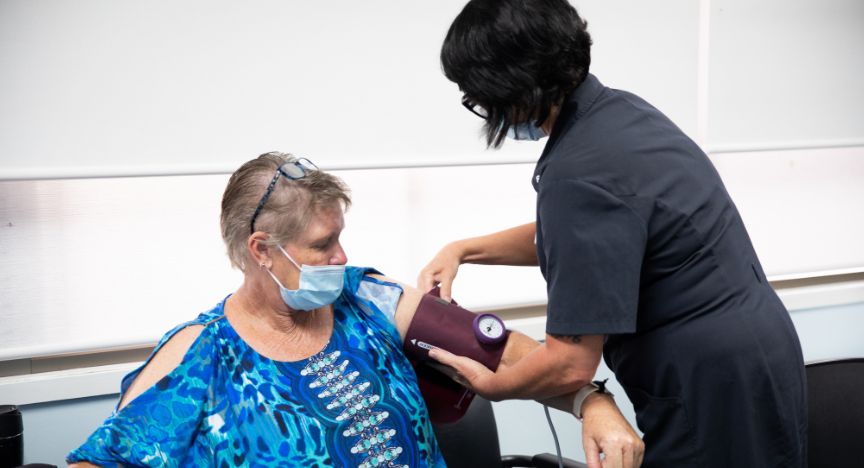
A unique partnership between Central West Hospital and Health Service and a metropolitan health service is delivering a new service for rural cardiac patients closer to home.
The new Ambulatory Blood Pressure Monitoring Service is being delivered in the Central West with the support of Metro North Hospital and Health Service’s Royal Brisbane and Women’s Hospital (RBWH).
Central West Hospital and Health Service Primary Health Team Assistant Director of Nursing Louise Poole said the service had started operating from today (15 March) and was similar to the 24-hour blood pressure (Holter) monitoring service available in Central West.
“We now have mobile equipment available that allows us to offer a blood pressure monitoring service to patients at smaller health facilities throughout the region,’’ she said.
“A blood pressure monitor, in the form of a small device that will be worn for 24 hours will automatically record you blood pressure.
“The monitor will take a reading every 30 minutes during the day and every 60 minutes at night.
“You will carry the monitor around in your pocket or in the carry bag provided and your readings will be interpreted by the Cardiac Investigations Unit at RBWH.
“Your GP will then follow up your management and arrange any further investigations or care as required.’’
Ms Poole said the service would be available to all patients in the Central West and would require a referral from their GP for an appointment with the new service, which would then be managed by the health service’s Specialist Outpatients Department.
The Ambulatory Blood Pressure Monitoring Service is an expansion of an extensive cardiac telehealth service already in place in the Central West since 2016 and supported by the Metro North HHS through its specialist hospitals – the RBWH and The Prince Charles.
“Through this partnership, as well as 24-hour holter monitoring and our new ambulatory blood pressure service, we can also put patients on an exercise treadmill at Longreach and other facilities with a doctor and nurse in attendance and test their cardiac systems under stress,’’ Ms Poole said.
“While they do this, a cardiac scientist and registrar at RBWH can watch the patient and provide education, support, and supervision via video-conferencing equipment.
“Patients can have their hearts checked and potential problems picked up early, without even having to leave the region.
“This is also allowing us to see patients who might previously have avoided undergoing cardiac testing or having a specialist appointment simply because they didn’t want to travel away to do so.’’
Ms Poole said the cardiac care partnership with the Metro North HHS hospitals was part of a much broader partnership developed with the metropolitan health service that also included delivery of a telechemotherapy service that started in 2018.
“This partnership is continuing to support efforts to deliver responsive, innovative, high quality and safe patient care closer to home and link Central West Health personnel to experienced advice across a range of corporate and clinical functions,’’ she said.
“Central West Health has a strong history of achieving great patient-centred and community-centred care. The delivery of services like cardiac telehealth and tele-chemotherapy are examples of making health care delivery changes with the focus squarely on patients and their support networks.
“But our capacity to do so is very much enhanced by partnerships such as the one we have with the Metro North HHS and its specialist tertiary hospitals.
“I would like to thank the Metro North HHS, along with Royal Brisbane and Women’s Hospital and The Prince Charles Hospital for their continuing strong support of our patients, our health service and our clinicians.’’
Ms Poole said, as well as benefitting patients, extending services such as cardiac telehealth to remote areas like the Central West also helped with staff retention.
“Recruiting and retaining clinical staff in remote areas is a strategic priority for us in the Central West and it is made much easier if you can offer them the opportunity to learn new skills and an interesting and satisfying work environment,’’ she said.
“It’s a win-win for everyone, for patients, for our staff and for the health service.”